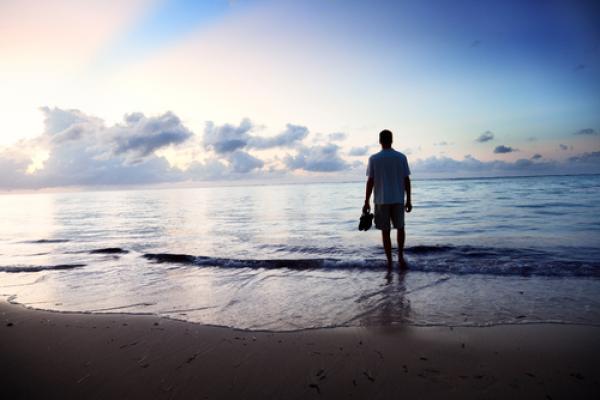There’s something very grounding about spending an entire day walking. Obviously you’re more connected, literally, to the earth, but the connection goes deeper than that. Little, if anything, passes by without notice. With enough time, nothing recedes into the background. You have time to actually notice everything.
There’s also something physiologically renewing about walking all day. It’s easy for forget that our bodies are made for this purpose. When we walk, everything works the way it’s supposed to. The back-and-forth exchange of tension and release in our spine, hips and shoulders serves to settled bones and joints into their proper place. You become aware of your own breathing, of the cadence of your stride, of the general rhythm of life around you.
I know, this sounds pretty esoteric and new-agey for me, but what do you expect? I’m in California after all. More than that, I’ve found this trip so far to be an embodying experience. By that, I mean that I’ve had the time and space to actually listen and respond to my body, rather than forcing it to meet another agenda.
When I’m tired, I sleep. I get up when I’m rested. I eat when I’m hungry, regardless of what time it is. I’ll have cereal at midnight or a beer at noon.
Sounds good, right? But I’m starting to think such attunement to our own natural needs and rhythms shouldn’t be considered such a luxury. In fact, it seems that this regular bodily disconnect can have other negative effects we might not even realize.
It goes beyond a lack of embodied living, actually; I hear people “brag” on a fairly regular basis about how little sleep they get, how many hours on end they work or how poorly they eat because of the demands of their schedules. Sorry, but this is not something to be proud of; it’s a sickness.
It’s no wonder, then, that on the rare occasion we actually slow down long enough to pray, worship, reflect or simply be in the moment, we have no idea how to do it. I watch people in church, and it’s clear from the body language that we don’t know how to slow down. I had a friend back in Texas who was so bad about overworking himself that he’d get sick every single time he took a vacation.
Some might argue this is a case for not taking time off in the first place, but that’s ignorant. Just because we can hold off the effects of frantic, disembodied living by pushing harder doesn’t mean we ever outrun the consequences.
Taken further, I think that such living is un-Biblical. I include myself among the guilty workaholics, mind you. But I feel like I’m getting a little bit of perspective on my own insanity. The problem is that our culture not only normalizes such insanity; we actually reward it.
Ideally, a church community would provide that sanctuary we lack to help us renew, refocus and remember who we are as fully embodied people. But more often than not, religion simply takes on the characteristics of the culture around it. As a result, we program everything to death, create worship services that add to the stimulation and distractedness, and we burn out our ministers well before their gifts are fully used.
Sure, Jesus went through periods of self-denial. He fasted, prayed alone and I bet he even missed a few meals finishing up a carpentry gig or two. But he also went to parties and enjoyed feasts, to the point of being criticized.
I have to wonder if this wasn’t part of a larger embodied spiritual practice. Yes, the partying stuff is fun and all, but it seems to fit with the whole “to everything there is a season” ethos. We can see the results of extreme self-denial all over the place, from child-molesting priests to businessmen drinking themselves into oblivion on the weekends.
It seems our psyches find ways to get their needs met, whether we choose to listen to them or not.
Christian Piatt is an author, editor, speaker, musician and spoken word artist. He co-founded Milagro Christian Church in Pueblo, Colorado with his wife, Rev. Amy Piatt, in 2004. Christian is the creator and editor of "Banned Questions About The Bible" and "Banned Questions About Jesus." His new memoir on faith, family and parenting is called "PREGMANCY: A Dad, a Little Dude and a Due Date." For more information about Christian, visitwww.christianpiatt.com, or find him on Twitter or Facebook.
Walking on the beach, Iakov Kalinin / Shutterstock.com
Got something to say about what you're reading? We value your feedback!
